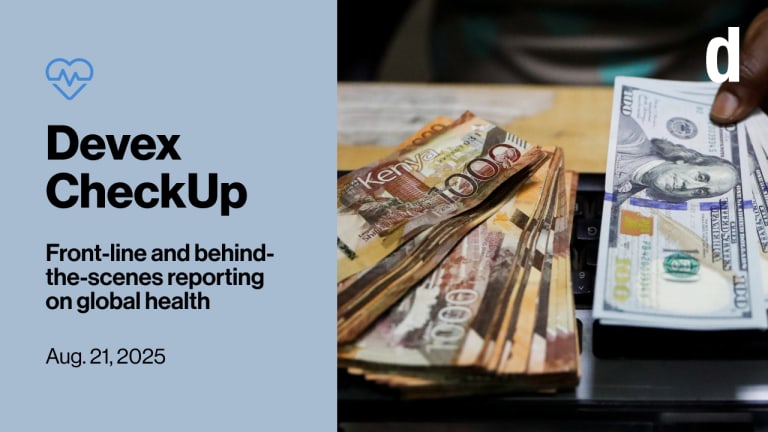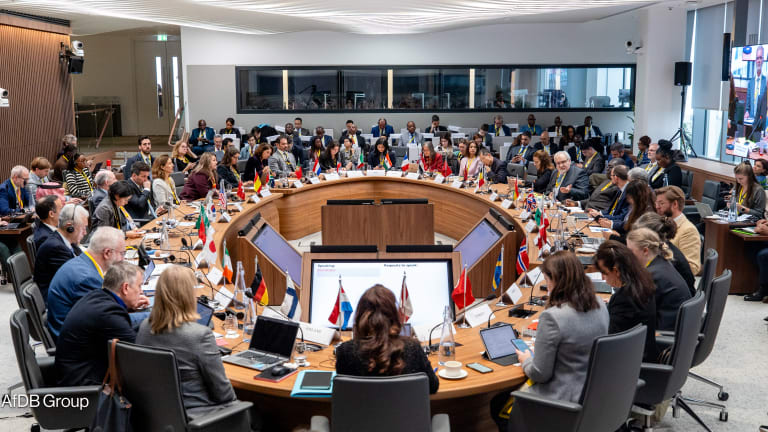Presented by Climate Action

The African Development Fund aims for a record haul of money for its upcoming replenishment — but in shooting for the moon, is it asking for too much?
Also in today’s edition: The Dutch follow the latest European fashion of slashing aid funds, and we look at the urgency behind antimicrobial resistance.
+ Join us on June 12 for an expert panel discussion on what’s at stake for aid in the upcoming U.K. election. It will cover the different visions for aid from the main parties, how aid organizations can prepare for the new government, a Q&A session, and more. Register now.
Pivotal moment
Amid discussions during the African Development Bank's annual meeting in Nairobi, Kenya, was the impending 17th replenishment cycle of the African Development Fund. With a chunky target of $25 billion, the fund is rallying for unprecedented support to bolster aid efforts across vulnerable regions of Africa.
This is a preview of Newswire
Sign up to this newsletter for an inside look at the biggest stories in global development, in your inbox daily.
Amid what's been dubbed a "development finance traffic jam" — with numerous international funds vying for attention — ADF's call for a substantial increase in funding comes at a critical juncture, writes Anthony Langat for Devex.
The current replenishment cycle saw decent growth, securing $8.9 billion in core ADF funding and $429 million for climate initiatives. But as the fund prepares for its next replenishment, some are concerned it may be too ambitious as wealthy donor countries are being asked to give to many replenishments at the same time — just as many of them have voters head to the polls and thus public sentiment to take into account.
Nonetheless, proponents emphasize the fund's proven track record — it’s invested over $40 billion in the region over the past half-century, earning recognition as one of the most effective aid providers in sub-Saharan Africa.
African leaders, led by Kenyan President William Ruto, have pledged support. But there's a growing call for greater advocacy and representation on the global stage to secure ADF's future.
“More needs to be done. We need to enable more African leaders to showcase their support. We would need them to speak more about the fund at the G20, in their bilateral meetings with donor governments, and talking points in key international moments and forums,” says Serah Makka, executive director for ONE Campaign in Africa.
Read: African Development Fund seeks $25B replenishment. Is it too ambitious?
+ How well did you keep up with the news last month? Take our quiz to find out.
U can’t Dutch this
The scale of impending cuts to Dutch development spending is now clear — and they are poised to shake the country's aid sector for years, writes Devex Senior Reporter Vince Chadwick.
The Netherlands, currently the world’s seventh-largest donor, gave $7.4 billion in aid last year. Now it’s slashing official development assistance, or ODA, as a percentage of gross national income to about 0.46% in 2027 from 0.66% in 2023. The new right-wing coalition has imposed cuts of €300 million in 2025, €500 million in 2026, and €2.4 billion annually from 2027.
Areas of giving are set to change too. Aid has traditionally focused on food security, water management, sexual and reproductive health and rights, security, and the rule of law. But the new government will now add migration to its list of priorities, with an emphasis on keeping refugees in their regions of origin. Meanwhile, conservative parties have made arguments against continuing to focus on sexual health and rights, concerned about imposing Dutch liberal sexual values on other cultures.
One sweetener for aid advocates, however, is the coalition's plan to cap the amount of ODA spent on housing refugees domestically at 10%, lower (though just barely) than the 11% cap recommended by the Advisory Council on International Affairs. The Netherlands spent 17.7% of its ODA on in-donor refugee costs in 2023, well above the OECD donor average of 13.8%.
But the new government also wants to reduce the number of asylum-seekers who get into the country in the first place. If it fails, the administration might backtrack on the 10% cap for in-donor refugee costs, Paul van den Berg, chief political adviser with the Dutch aid group Cordaid, tells Vince.
Read: The Netherlands is cutting billions from aid. What happens next? (Pro)
+ Not yet a Devex Pro member? Start your 15-day free trial today to access all our exclusive reporting and analyses, members-only events, the world’s largest global development job board, and the Weekender — a special Sunday newsletter covering our industry’s big moves for Pro members.
Target practice
Antimicrobial resistance, also known as AMR, already directly kills an estimated 1.3 million people a year, but it’s long been a neglected issue. That seems to be changing, though. At the World Health Assembly last week it saw more discussion than in previous years. Countries adopted a resolution to step up global action combating AMR and continued preparing for a high-level meeting in September at the United Nations General Assembly where it’s hoped a political declaration on the issue will be made that can serve as a foundation for a more coordinated global response. A zero draft of this declaration was already floating around WHA.
AMR occurs when bacteria, viruses, fungi, and parasites become resistant to medications, jeopardizing the effectiveness of modern medicine. This "silent pandemic" is threatening to undo decades of medical progress, writes Devex Senior Reporter Sara Jerving. The meeting at UNGA will be the first high-level gathering of this kind on AMR in nearly a decade.
Also at WHA, the Lancet kicked off a series by 40 authors on the need for access to effective antibiotics, estimating that a huge number of the deaths caused by AMR could be prevented by sanitation, vaccines, and other measures.
Jeremy Knox, head of policy for infectious diseases at Wellcome, told a Devex-hosted event on the sidelines of WHA that there are three things that need to happen at September’s meeting to effectively move the conversation on AMR forward.
The first? Targets.
“We've seen in other areas of global health and climate change, it's been really important to have very clear metrics of what success looks like and being able to keep track of progress towards those,” Knox said. “What gets measured, gets managed.”
But the specifics of those targets are under debate, with the Lancet series calling for different metrics than what’s currently outlined in the zero draft.
Read on for the specifics of those targets — and Knox’s other two must-haves for September’s meeting.
Read: Is the fight against antimicrobial resistance finally gaining traction?
+ For the latest insider reporting on global health, be sure to sign up to Devex CheckUp, a free, Thursday newsletter.
Government agency
The long-standing tussle over health priorities in Africa is finally favoring governments, thanks to their increased investments in domestic health systems and donors’ growing recognition of the importance of aligning with local goals.
That trend was highlighted by Dr. Ebere Okereke, CEO of the Africa Public Health Foundation, during a Devex CheckUp panel discussion at the World Health Assembly. “I see a trend towards alignment from the big to the small donors,” she noted.
The focus is now on translating emergency responses into routine health investments, starting with building government capacity to enhance coordination and help donors align with national objectives. The Africa Centres for Disease Control and Prevention's Digital Transformation Strategy, which involves member states in developing shared health priorities, serves as a model for this approach, according to Cyril Seck, a strategy adviser with Africa CDC.
Despite progress, there's concern about whether governments can keep those efforts going financially. Domestic health funding has improved post-pandemic, Okereke said, but she admitted there has been a dip thanks to post-pandemic debts and the general economic downturn.
Nonetheless, the pandemic highlighted for finance ministers the critical importance of health sector investments as key to economic stability. The “direction of travel was right,” Okereke said, “but it is quite slow.”
Read: Donors learning to align with health priorities of African governments
+ Looking for a recap of other top globaldev news that made headlines this week? We’ve got you covered with a detailed rundown in the latest episode of our weekly podcast hosted by Devex Editor-in-Chief Raj Kumar and covering topics from the U.S. foreign aid budget cuts to talking points from the small island developing states’ fourth conference. Listen here.
In other news
Denmark, Greece, Pakistan, Panama, and Somalia have been elected to join the 15-member U.N. Security Council beginning 2025. [Reuters]
The Arab Bank for Economic Development in Africa has provided $500 million in capital infusion to the West African Development Bank. [Bloomberg]
The World Food Programme on Thursday announced it will scale up its operations in Sudan to reach 5 million more people by the end of the year to avoid famine in the country. [UN News]
Sign up to Newswire for an inside look at the biggest stories in global development.








